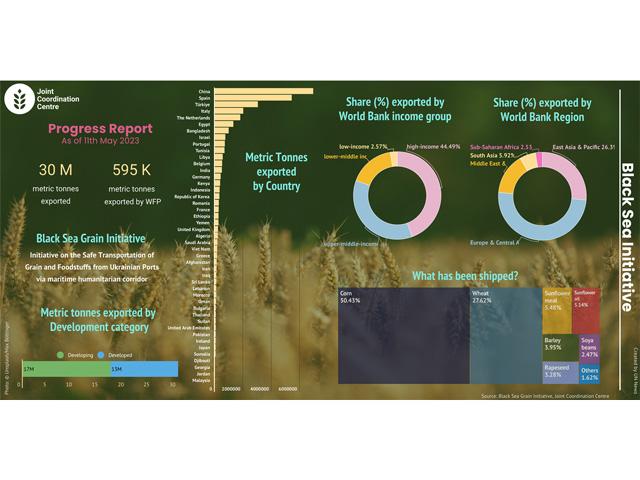Eyes Again on Black Sea Grain Deadline
USDA Creates a Dashboard to Show Grain Exports Out of Black Sea Region
OMAHA (DTN) -- As talks continue to extend the Black Sea Grain Initiative beyond Thursday, USDA released a "dashboard" seeking to show the value of the region for food security.
Talks continue over another extension of the grain deal that has allowed Ukraine to export more than 30 million metric tons (mmt) of grain and oilseeds since July of last year. The United Nations has called its extension "vital for global food security."
If Russia does not agree to extend the deal beyond Thursday, that means cargo ships would not be assured safe passage in and out of Ukrainian ports.
Martin Griffiths, the U.N. head of humanitarian aid, updated the U.N. Security Council on Monday about the status of the war in Ukraine and called on Russia and all parties to continue to extend the grain initiative. Griffiths cited the decline in wheat prices globally was due in part to the volumes of grain coming out of Ukraine. More is needed to keep "predictable supplies of humanitarian food assistance" flowing, he said.
While there are concerns about the state of the wheat crop in Kansas and the extension of the Black Sea Grain Initiative, none of that is helping wheat or other grain prices this week. July wheat was down 16 1/2 cents in trading on Tuesday at just over $6.44 a bushel. Other wheat contracts were also down.
P[L1] D[0x0] M[300x250] OOP[F] ADUNIT[] T[]
Wheat has accounted for about 28% of the shipments out of Ukraine under the agreement while corn accounts for about 50% of all the grain moved out. Sunflower oil and meal account for about 11% and other commodities account for another 11%.
According to the U.N., China, Spain, Turkey and Italy have been the biggest importers in the Black Sea deal.
During the weekend, Cindy McCain, head of the World Food Program, pointed out that a charged vessel from Ukraine had arrived in Yemen, one of 20 ships delivering 600,000 metric tons of Ukrainian wheat for WFP operations globally. "For millions of people, this aid is lifesaving," McCain stated. She added, "The Black Sea Grain Initiative must be renewed."
A new deal for the commodity shipments is also important to European Union farmers who have increasingly demanded changes in policy given that a flood of commodity crops from Ukraine are continuing to pour into Eastern Europe as well. A shutoff from the Black Sea would only exacerbate those tensions.
USDA's Foreign Agricultural Service (FAS) on Tuesday released a new dashboard to detail the volume of grain and oilseed out of the Black Sea region each year. The analysis focuses on key commodities, including barley, corn, soybean oil, sunflower seed oil and wheat. For each country, the largest suppliers are shown, which allows the dashboard to illustrate the potential impact of Russia's war in Ukraine, USDA stated.
"Russia's war in Ukraine has had a major impact on grain and oilseed exports from the Black Sea region," said USDA Under Secretary for Trade and Foreign Agricultural Affairs Alexis M. Taylor. "By looking at the Vulnerabilities to Trade Disruption dashboard, it becomes very clear how big an impact Russia's war has on food security in countries in Asia, Africa, and the Middle East, as many countries in these regions import a significant portion of their grains and oilseeds from Ukraine and Russia."
USDA dashboard: https://www.fas.usda.gov/…
United Nations Black Sea update: https://www.un.org/…
Chris Clayton can be reached at Chris.Clayton@dtn.com
Follow him on Twitter @ChrisClaytonDTN
(c) Copyright 2023 DTN, LLC. All rights reserved.




